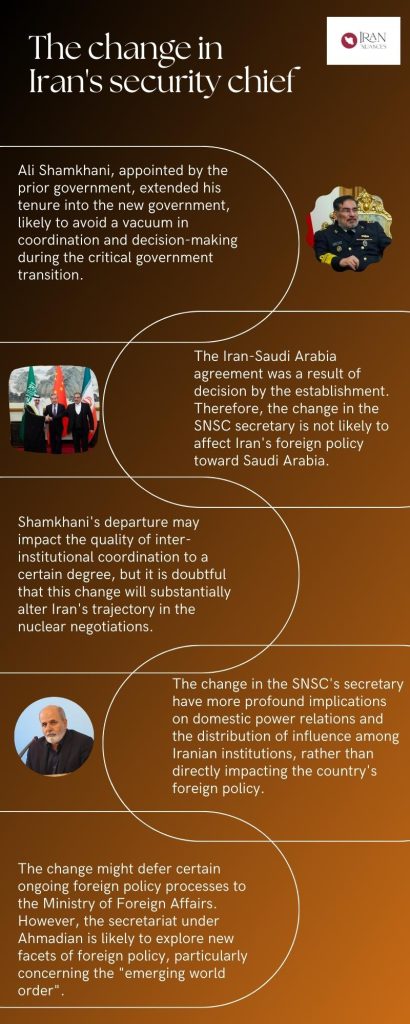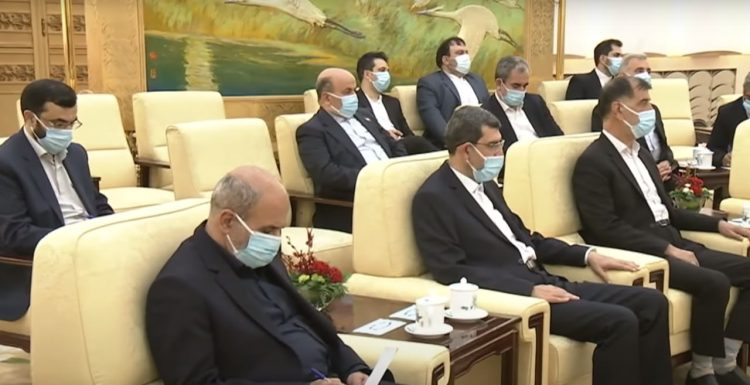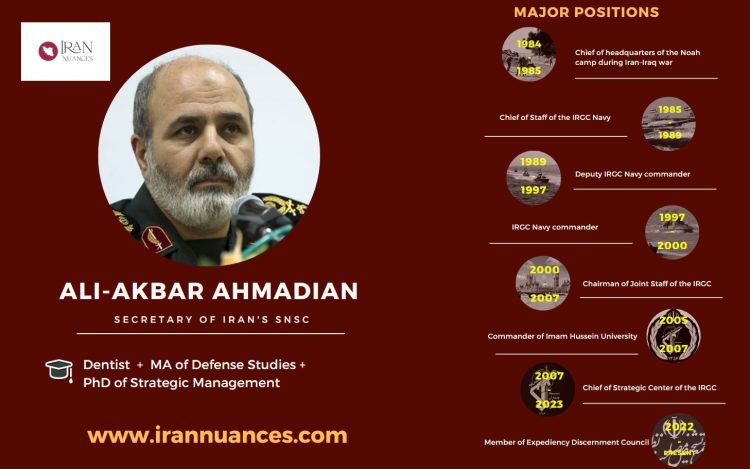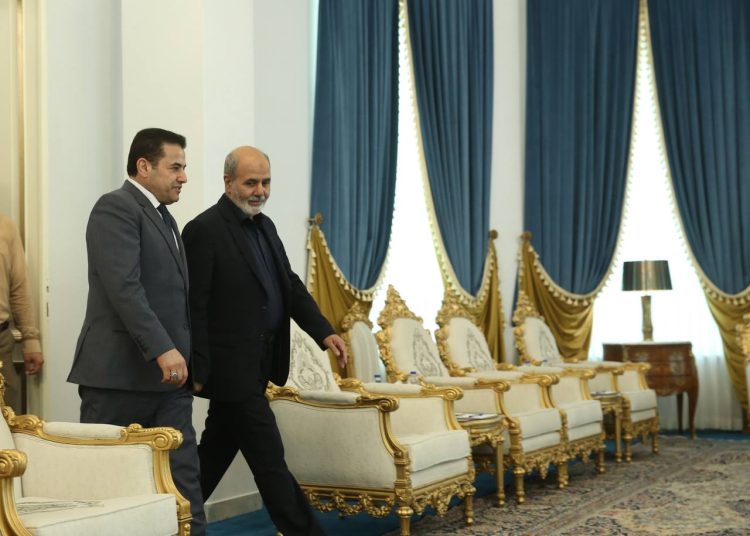The change of Iran’s security chief might defer certain ongoing foreign policy processes to the Ministry of Foreign Affairs. However, the SNSC secretariat under Ali Akbar Ahmadian is likely to explore new facets of foreign policy, particularly concerning the “emerging world order”.
After a decade-long tenure at the helm of Iran’s Supreme National Security Council (SNSC), Ali Shamkhani relinquished his role as secretary to his successor, Ali Akbar Ahmadian, on Monday, May 22. Though the transition of power did not come as a surprise, with rumors circulating for some time, the significance of the timing and subsequent implications for Iran’s national security and foreign policy decision-making process have piqued the interest of domestic and foreign observers alike. The limited information available on the new secretary’s profile and perspectives further accentuates the intrigue surrounding this development.
The SNSC Secretary and the Institutional Dynamics
The SNSC, chaired by the Iranian president, operates under a secretary, who is appointed through presidential nomination and the approval of the nation’s Leader. This individual is responsible for coordinating the efforts of various institutions dedicated to addressing national security concerns. The secretary’s influence, however, hinges on the individual occupying the position.
Foreign policy has remained a contentious issue in Iran for several decades, and while the secretary of the council is charged with coordination, the individual’s attributes can impact the coordination process and set the tone for policy-making. To further illustrate, the characteristics of particular governments impact the extent to which institutions participate in Iran’s foreign policy arena. For instance, during Hassan Rouhani’s government, nuclear negotiations fell under the jurisdiction of the Ministry of Foreign Affairs under Mohammad Javad Zarif, with the SNSC offering macro-level guidance. This differed from previous arrangements, when key figures such as Rouhani, Ali Larijani, and Saeed Jalili helmed the nuclear negotiations while concurrently serving as the secretaries of the council.
Following the conclusion of President Rouhani’s term and the inauguration of his successor, Ebrahim Raisi, the secretariat’s role in nuclear negotiations gradually expanded, albeit not to previously witnessed levels. Furthermore, Ali Shamkhani, appointed by the prior government, extended his tenure into the new government, likely to avoid a vacuum in coordination and decision-making during the critical government transition and given the pressing domestic and international issues facing Iran. Boasting familiarity with the nuclear negotiations process from the previous government, Shamkhani endeavored to strengthen his coordination role within the current government. However, the negotiations have yet to reach a conclusive outcome.
Shamkhani’s Diplomatic Endeavors
Notably, recent foreign policy developments have also seen Iran reaching an agreement with Saudi Arabia and enhancing cooperation with other regional states. Negotiations with Saudi Arabia, spearheaded by Shamkhani’s former deputy in foreign affairs, Amir Saeed Iravani, commenced around two years ago in Iraq. Iravani now serves as Iran’s permanent representative to the United Nations in New York.
The negotiations culminated in Beijing, with both Shamkhani and his Saudi counterpart in attendance, and a mutual agreement to reestablish bilateral relations within a two-month timeframe. This milestone was subsequently followed by a meeting between the Iranian and Saudi Arabian foreign ministers in Beijing.
Hailing from the southern region of Iran and proficient in Arabic, Shamkhani has made efforts to cultivate his image as a key figure in engaging with regional countries, aligning with the priorities of the current Iranian administration. Notably, he has extended his diplomatic endeavors to the United Arab Emirates, further solidifying his influence in regional engagements.

Iran’s Foreign Policy amid Transition in SNSC: Continuity or Change?
Thus, the pertinent question emerges: what influence will the transition in security leadership have on Iran’s foreign policy, encompassing the Iran-Saudi Arabia agreement and nuclear negotiations?
While it is undeniable that Shamkhani and his former deputy were instrumental in fostering dialogue with Saudi Arabia, the restoration of bilateral relations was predicated on a macro-level policy and a decision by the establishment. Consequently, it is improbable that this trajectory will be derailed or remain incomplete with Shamkhani’s departure. Furthermore, institutions and officials from other sectors, such as the security apparatus and the Ministry of Foreign Affairs, also participated in the Saudi Arabia negotiations, and many continue to shape Iran’s foreign policy landscape.
Alireza Enayati, Iran’s pick to be the new ambassador to Riyadh, was an integral participant in these talks. According to Iran’s Foreign Minister, Hossein Amirabdollahian, Tehran proposed Enayati as their representative in the Beijing discussions which culminated in the agreement. However, the Saudi side desired the conference to convene between the secretary of Iran’s Supreme National Security Council and counterpart. Whether this preference arose due to the desire for elevated talks or an affinity for Shamkhani remains a question best answered by the Saudi side.
Additionally, a critical aspect of the Iran-Saudi Arabia agreement pertains to the situation in Yemen and the cessation of the war. Iran consistently advocated for a Yemeni-Yemeni dialogue and solution and emphasized the necessity of concluding the war. The Saudi side, however, persistently demanded that the Yemeni issue be addressed in the Iran-Saudi discussions, urging Iran to leverage its influence in the conflict resolution process. This contention rendered the talks challenging until the third round of the talks in Baghdad, at which both sides endeavored to prevent the contentious issue from thwarting progress. Given the security implications of the Yemeni crisis, it is natural to anticipate Iran’s security institutions, including the Islamic Revolution Guard Corps (IRGC), to play a pivotal role in resolving the matter.
The multifaceted and complex nature of the Iran-Saudi Arabia agreement underscores the fact that its resolution occurred at the macro and the establishment level. The initiation and continuation of discussions under the previous government through the SNSC, whose secretary is appointed with the Leader’s approval, attest to this reality. As such, it seems unlikely that Shamkhani’s departure will significantly alter Iran’s foreign policy approach toward Saudi Arabia.
In the realm of nuclear negotiations, Shamkhani’s coordination role was further solidified toward the end of Rouhani’s administration. During this period, Shamkhani’s perspective diverged from the then-government regarding several issues and methods, and ultimately became more closely aligned with the establishment and conservative factions. With the inauguration of the new administration, officials and chief negotiators underwent a natural transformation; however, Shamkhani remained one of the few constants in the nuclear negotiations decision-making circle. Although his coordination role during this period was relatively significant, the crucial factor is that momentous decisions within Iran occur at the level of the Supreme National Security Council, under president’s purview and the Leader’s consent. Given that the secretary of the council was not the chief negotiator, Shamkhani’s departure may impact the quality of inter-institutional coordination to a certain degree, but it is doubtful that this change will substantially alter Iran’s trajectory in the negotiations.
Perhaps the change in the SNSC’s secretary have more profound implications on domestic power relations and the distribution of influence among Iranian institutions, rather than directly impacting the country’s foreign policy. For instance, a diminished role for the council’s secretariat might result in expanded prominence for other organizations, such as the Ministry of Foreign Affairs, in foreign policy matters.
What We Know about Ahmadian?
The ensuing question concerns the attributes and qualifications of Ali Akbar Ahmadian, the newly appointed secretary. To date, the public domain lacks credible and reliable information on Ahmadian’s characteristics, featuring predominantly superficial speculations and conjectures.
Nonetheless, Iran Nuances correspondent in Tehran has explored this topic from several sources. With regards to domestic affairs, one source who is well-acquainted with Ahmadian contends that he is “not a factional person,” challenging reports that associate him with specific political parties or factions. The source, speaking in the condition of anonymity with Iran Nuances, depicts Ahmadian as a “serious person” with remarkable “coordination abilities.”
Another source, possessing more detailed insights into Ahmadian’s persona, lauds his “strategic thinking, strong managerial acumen, decisiveness, and great coordination capabilities.” This source anticipates that Ahmadian’s presence will “redesign and elevate the role of the Supreme National Security Council Secretariat.”
President Ebrahim Raisi, in his appointment letter, cited Ahmadian’s “strategic view” as a key reason for his selection. Raisi has called upon Ahmadian to address “social, political, and economic security” issues “innovatively and intelligently”, while also leveraging the people’s capacities in fostering “people-oriented” and “sustainable” security. The president further seeks “synergizing” the nation’s “intelligence, security, executive, and judicial systems” under Ahmadian’s stewardship.
The letter’s contents suggest an expectation for a redefined coordination role of the council’s secretariat across numerous domains, not limited to specific areas. Moreover, in the domestic realm, Ahmadian is likely to tackle issues including reducing social divide, countering soft threats, and fortifying the nation’s cyber capabilities, possibly in response to last fall’s protests.
Ahmadian is also a supporter of the “asymmetric defense” paradigm in the military field.
Iran Nuances learned that on the day of Ahmadian’s appointment, President Raisi convened a consequential meeting with him. It is understood that Ahmadian closely cooperates with the president, and that he has the president’s endorsement.
New SNSC Secretary and Iran’s Foreign Policy
In the realm of foreign policy, Ahmadian’s lack of executive experience has attracted considerable attention, provoking suspicions that the secretariat’s role in foreign policy might diminish during his tenure, making way for other institutions, such as the Ministry of Foreign Affairs, to rise in prominence. However, within a week of his appointment, Ahmadian met with his Iraqi counterpart in Tehran and participated in a gathering of Iranian ambassadors to foreign countries and international organizations. Days prior to his appointment, Ahmadian also traveled to China as part of a delegation from the Expediency Discernment Council, attending meetings with Chinese officials.

An early focus on foreign policy in news reports about the new secretary perhaps aims to say that Ahmadian might have a role to play in this domain, contradicting the views of some experts and observers. Furthermore, the selection of the deputy secretary for foreign affairs is likely to be significant, as this individual could bolster Ahmadian’s efforts in the foreign policy realm.
One of Iran Nuances’ sources contends that with Ahmadian at the helm of the SNSC Secretariat “some strategies will be formulated with regard to Iran’s role in the new world order.” Ahmadian for long years had been the head of the IRGC’s Strategic Center and, according to a source, he has conducted studies in the field of the emerging world order.
The potential impact and specifications of the new secretary’s role in foreign policy remain an open question for the future. Ahmadian’s absence of experience in this area does not necessarily entail a weakened secretariat in foreign affairs as a whole. While it might indeed reduce its focus in some aspects of foreign policy, deferring certain ongoing processes to the Ministry of Foreign Affairs, the secretariat under Ahmadian’s leadership is likely to explore new facets of foreign policy, particularly concerning the “emerging world order.”
In a meeting with Iranian foreign ministry officials and ambassadors to foreign countries and international organizations on May 20, Iran’s Leader underscored the necessity of “accurately positioning Iran in the new world order by monitoring global developments, assessing the trajectory of events, and uncovering the forces operating behind the scenes.”







